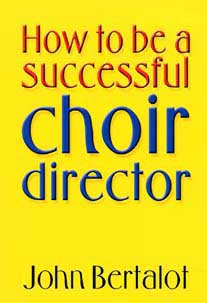How to transform your choir
and fill your stalls with
enthusiastic singers
2. How to get your choir enthused!

DR JOHN BERTALOT
Organist Emeritus, St. Matthew's Church, Northampton
Cathedral Organist Emeritus, Blackburn Cathedral, UK
Director of Music Emeritus, Trinity Episcopal Church, Princeton NJ, USA
When I led a workshop for 30 directors of school music at a leading Public School in East Anglia I was asked two basic questions:
1) How can choirmasters make the best use of insufficient time for rehearsals? and
2) How can choirmasters deal with their singers’ boredom when they’re asked to sing a passage yet again to try to get it right?
The answer to both questions is the same: give the responsibility for the singing to your singers.
We were given a superb example of this at the end of my morning session in the school.
Self-discipline
The school has a strong naval tradition and six senior boys, in naval uniform, gave us a demonstration of Beating the Retreat. They carried through their highly detailed programme of marching and counter-marching whilst, at the same time, beating their drums and twirling their drumsticks in complicated rhythms. We were amazed at their sense of self-discipline, for the 15-minute programme was carried out without a single order being given.
To us it was a perfect performance from beginning to end, but we learned shortly afterwards that the boys themselves were so critical of their performance that they practised the parts that hadn’t reached the high standards they’d set themselves until they were right.
Now because their master had given the responsibility to the boys, they accepted that responsibility, and strove their utmost to make their performance as good as it could be. But if the master had stood over them and given them orders during their performance, their attitude would have been quite different. The responsibility for the performance would have been his, not the boys’.
That’s exactly what I mean when I suggest that choirmasters should give responsibility for the standard of singing to the singers themselves. And this is best done by asking questions instead of telling them what to do: ‘Was that wholly right? Did you all start together? Was that too loud or too soft?’ When singers say, ‘We need to do that again because we can do it better’, their whole attitude to rehearsals will have taken a smart about turn!
What does that mean in practice?

Standing up together
Shortly after I became organist and choirmaster of a village church in the heart of the Lancashire countryside (after having retired from full-time music-making in the USA) I suggested to my small adult choir that they might like to stand up and sit down together during rehearsals and services. Why? Because the act of standing up together meant that they would have to look across at one another – come to ‘attention’ – before they stood up. By that act of awareness of each other they immediately began to feel that they were a self-disciplined body.
The best definition of a good choir I have ever heard is that it should be ‘a disciplined body of singers’. Is your choir are (a) a ‘body’ - instead of a miscellaneous group of variably talented, or untalented singers? and (b) do your singers have that sense of self-discipline which will enable them to want to sing superbly? I found that the act of standing up together gave my village choir that essential feeling of ‘disciplined body’ – and what’s more, they enjoyed it. They want to sing to the highest standard that they can, and it’s my job to enable them, not to brow-beat them, to succeed.

Laughter!
By the way, when they first tried standing up together they collapsed in laughter because it wasn’t right. ‘Let’s do it again!’ they said – and, after two or three more attempts, they managed it. And they were pleased with themselves for it was they who got it right, not me! (A sense of humour is essential if you are to be a successful choirmaster!)
This will work not only for local volunteer adult singers, but also for children, teenagers and also for choirs of professional singers including cathedral choirs. You only have to look at choirs which sing at Promenade concerts on TV to see their pride not only in standing and sitting together, but also holding their books well. They’re winning before they sing a note.
How can this attitude be introduced to your choir?
Appoint two leaders
Appoint a singer on either side of your choir to give the lead in standing and sitting together. If it’s a church choir, they know as well as you do when they should stand to sing a hymn or anthem, and if it’s a choral society, they will know when they should stand to sing the next chorus, without you, their conductor, having to indicate this to them (for they will have marked their scores during rehearsals).
So appoint one singer to be the primary leader, and the other take their time from him or her. Practise this during rehearsals. Say, ‘When you are ready, stand up together, wait for a few seconds, and then sit down again.’ Then step back and let your two leaders take charge. It won’t work perfectly first time – indeed, my choir broke down into helpless laughter when they first tried it, but they realized that it was something they should do, and after a few tries, they succeeded. You’ll find that your singers will try much harder once this simple responsibility has been given to them.
And that’s the whole point of the exercise – to get them to try harder all the time. That answers the two basic questions I was asked at that workshop. They will learn much more quickly when their concentration has been sharpened by this simple manoeuvre and, when the singing isn’t right, it is they who will want to persevere until it is right, for they will take a pride in what they are achieving.
Start every practice well
I begin all my rehearsals with warm ups – different ones each week to keep them on their toes. Such as, ‘When you are ready, sing this note (I play a G) to “ah” for 12 beats.’ I then stand back and the two leaders take over. All the singers come immediately into focus – it’s a wonderful sensation, for they become ‘a disciplined body of singers’ without my having to nag them: ‘Do pay attention. Please stop talking!’ No, there’s no need for that. They’re so self-disciplined during services that I watch my leaders for cut-offs at the ends of hymns and accompanied anthems! My village choir continually achieves a great deal in a very short time, for everyone is trying their hardest all the time.
Try it!
© John Bertalot, Blackburn 2013
Next article: Do you look at your singers?
You may think you do but,
almost certainly, you don’t!

Dr Bertalot’s choirtraining books are available, cut price, from Amazon and online